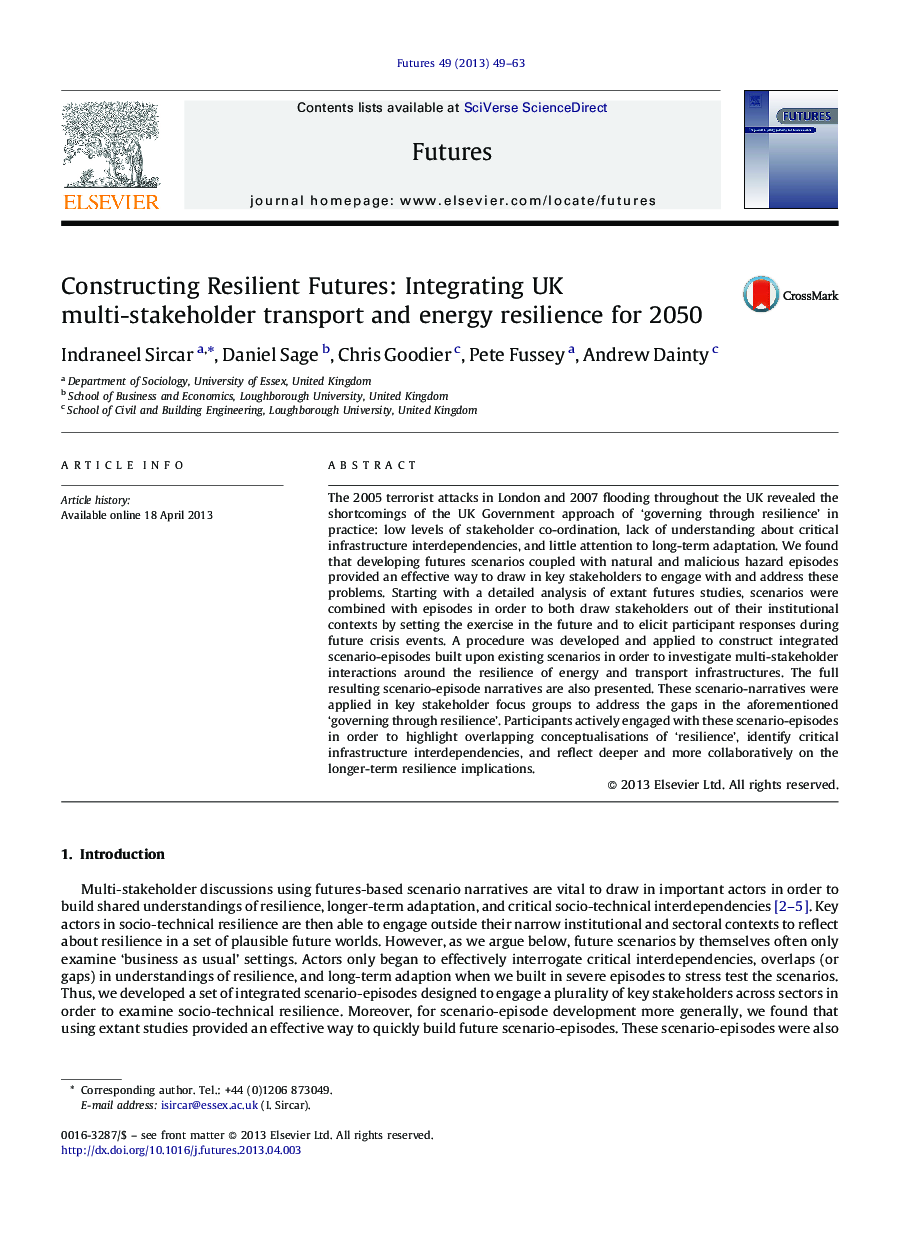| کد مقاله | کد نشریه | سال انتشار | مقاله انگلیسی | نسخه تمام متن |
|---|---|---|---|---|
| 7424650 | 1482780 | 2013 | 15 صفحه PDF | دانلود رایگان |
عنوان انگلیسی مقاله ISI
Constructing Resilient Futures: Integrating UK multi-stakeholder transport and energy resilience for 2050
ترجمه فارسی عنوان
ساختن آینده انعطاف پذیر: ادغام حمل و نقل و انعطاف پذیری انرژی چند شرکت ذیربط در سال 2050
دانلود مقاله + سفارش ترجمه
دانلود مقاله ISI انگلیسی
رایگان برای ایرانیان
ترجمه چکیده
حملات تروریستی سال 2005 در لندن و سال 2007 سیل در سراسر انگلستان، نشان دهنده نقصان دولت رویکرد دولت انگلیس از "حاکمیت از طریق انعطاف پذیری" در عمل است: سطح پایین هماهنگی ذینفعان، عدم درک در مورد وابستگی های انتقادی و زیربنایی و توجه کمی به طولانی سازگاری کوتاه مدت ما دریافتیم که توسعه سناریوهای آینده، همراه با وقایع خطرناک طبیعی و مخرب، راهی مؤثر برای جذب ذینفعان کلیدی برای مشارکت و حل این مشکلات است. با شروع یک تجزیه و تحلیل دقیق از مطالعات آینده در حال حاضر، سناریوها با قسمت های مختلف ترکیب شده اند تا هر یک از ذینفعان را از محیط های سازمانی خود با تنظیم تمرینات در آینده و همچنین پاسخگویی به مشارکت کنندگان در حوادث بحران آینده مطلع کنند. یک روش برای ایجاد صحنه های یکپارچه سناریو ساخته شده براساس سناریوهای موجود برای ارزیابی تعاملات چند جانبه در اطراف انعطاف پذیری زیرساخت های انرژی و حمل و نقل، مورد استفاده قرار گرفت. روایتهای کامل سناریوهای داستان نیز ارائه شده است. این روایت های سناریو در گروه های اصلی ذینفع ذینفع برای رسیدگی به شکاف در "حاکمیت از طریق انعطاف پذیری" ذکر شده است. شرکت کنندگان به طور جدی با این قسمت های سناریو مشارکت می کنند تا مفهوم سازی "انعطاف پذیری" را با هم تداخل می کنند، وابستگی های زیربنایی بحرانی را شناسایی می کنند و همبستگی بیشتری با مفاهیم پایداری درازمدت دارند.
موضوعات مرتبط
علوم انسانی و اجتماعی
مدیریت، کسب و کار و حسابداری
کسب و کار و مدیریت بین المللی
چکیده انگلیسی
The 2005 terrorist attacks in London and 2007 flooding throughout the UK revealed the shortcomings of the UK Government approach of 'governing through resilience' in practice: low levels of stakeholder co-ordination, lack of understanding about critical infrastructure interdependencies, and little attention to long-term adaptation. We found that developing futures scenarios coupled with natural and malicious hazard episodes provided an effective way to draw in key stakeholders to engage with and address these problems. Starting with a detailed analysis of extant futures studies, scenarios were combined with episodes in order to both draw stakeholders out of their institutional contexts by setting the exercise in the future and to elicit participant responses during future crisis events. A procedure was developed and applied to construct integrated scenario-episodes built upon existing scenarios in order to investigate multi-stakeholder interactions around the resilience of energy and transport infrastructures. The full resulting scenario-episode narratives are also presented. These scenario-narratives were applied in key stakeholder focus groups to address the gaps in the aforementioned 'governing through resilience'. Participants actively engaged with these scenario-episodes in order to highlight overlapping conceptualisations of 'resilience', identify critical infrastructure interdependencies, and reflect deeper and more collaboratively on the longer-term resilience implications.
ناشر
Database: Elsevier - ScienceDirect (ساینس دایرکت)
Journal: Futures - Volume 49, May 2013, Pages 49-63
Journal: Futures - Volume 49, May 2013, Pages 49-63
نویسندگان
Indraneel Sircar, Daniel Sage, Chris Goodier, Pete Fussey, Andrew Dainty,
